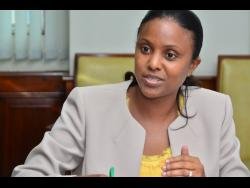Urgent Call for Support: One-Third of Jamaican Four-Year-Olds Need Further Evaluation
In a startling revelation, over one-third of Jamaican four-year-olds assessed for school readiness in 2024 have been flagged for further developmental evaluation. This raises significant concerns about the long delays in accessing essential support services for our youngest learners.
According to data from the Early Childhood Commission (ECC), a staggering 38% of the 29,729 children assessed through the Jamaica School Readiness Assessment (JSRA)—approximately 11,291 kids—were referred for secondary screening. This means they need evaluation by developmental specialists. Additionally, 7.6% (2,254 children) were recommended for classroom monitoring. Alarmingly, only about 54.4% of these children met the key developmental milestones expected for their age.
Understanding the Assessment
Trisha Williams Singh, Chairman of the ECC, explained that the JSRA has been in use since 2022 to identify children who may require extra support before entering primary school. The assessment, conducted across around 2,300 early childhood institutions, categorizes children into three groups: those ready for school, those needing classroom monitoring, and those requiring secondary screening.
Williams Singh noted that while the early childhood curriculum is often play-based, it shifts dramatically when children transition to primary school. “You do activities in early years, but when you start primary school, the teaching style changes,” she shared.
A Critical Shortage of Specialists
The urgent need for more developmental specialists in Jamaica cannot be overstated. “One of the challenges is that we don’t have a lot of those specialists,” Williams Singh said. Parents who notice issues with their children often face long wait times to see the few specialists available. A formal diagnosis of special needs must come from a clinical psychologist, and of the 11,291 children referred for further screening, 6,847 were identified as needing support across all developmental domains.
To tackle this shortage, the ECC is collaborating with the University of the West Indies to develop new training programs. Williams Singh also highlighted the necessity for more social workers at the community level to assist overwhelmed parents.
The Ripple Effect on Education
The situation is dire, as highlighted by Reverend Claude Ellis, principal of Pembroke Hall High. He revealed that over 70% of the 220 grade-seven students at his school entered unable to read or only at a grade-three level. Some students suspected of having special education needs remain unassessed due to long wait times at the Mico Care Centre and a lack of parental cooperation.
Williams Singh emphasized that funding is a significant barrier to addressing these issues. “When we identify these children, the solution requires funding,” she stated, urging that more resources be directed toward early childhood education rather than primarily focusing on primary and secondary levels.
Innovative Solutions on the Horizon
In response to these challenges, Opposition spokesman on education, Senator Damion Crawford, proposed the creation of “infant brain builder centres” for children aged one to three. Citing research that shows 90% of brain development occurs by age five, he argued that waiting until age six is too late.
Crawford envisions building 1,000 brain builder centres, utilizing church halls during midweek when they are often empty. He suggested that the HEART/NSTA Trust could train facilitators for these centres, ensuring a consistent educational experience across the island.
A Community Effort
As the conversation around early childhood education continues, it’s clear that community involvement is crucial. “Let’s look at the root,” Williams Singh urged. “If you’re not ready for learning at an early stage, it’s natural to think you’ll struggle later on.”
With the right support and resources, Jamaica can pave the way for a brighter future for its youngest learners. How can we, as a community, step up to ensure that every child is ready to learn?

